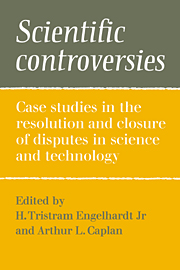 Scientific Controversies
Scientific Controversies Book contents
- Frontmatter
- Contents
- Preface
- List of contributors
- Introduction: Patterns of controversy and closure: the interplay of knowledge, values, and political forces
- PART I THEORETICAL PERSPECTIVES
- PART II CONTEMPORARY CASE STUDIES
- 12 Resolution of the Laetrile controversy: past attempts and future prospects
- 13 Federal regulation of Laetrile
- 14 Quasi libertarianism and the Laetrile controversy
- 15 Judicial deflection of scientific questions: pushing the Laetrile controversy toward medical closure
- 16 Politics, science, and the problem of psychiatric nomenclature: a case study of the American Psychiatric Association referendum on homosexuality
- 17 The diagnostic status of homosexuality in DSM-III: a reformulation of the issues
- 18 On arriving at the American Psychiatric Association decision on homosexuality
- 19 Values in the debate over workplace safety and health: the rancorous rhetoric about regulation
- 20 The successful experiment that failed
- 21 The power of efficiency: balancing benefits and costs in regulating occupational exposure to toxic substances
- 22 Closure in occupational safety and health: the benzene and cotton dust decisions
- 23 Nuclear fear: a history and an experiment
- 24 Closure and controversy: Three Mile Island
- 25 Understanding the nuclear power controversy
- PART III CONTROVERSY, CLOSURE, AND THE PUBLIC
- Author index
- Subject index
18 - On arriving at the American Psychiatric Association decision on homosexuality
Published online by Cambridge University Press: 03 February 2010
- Frontmatter
- Contents
- Preface
- List of contributors
- Introduction: Patterns of controversy and closure: the interplay of knowledge, values, and political forces
- PART I THEORETICAL PERSPECTIVES
- PART II CONTEMPORARY CASE STUDIES
- 12 Resolution of the Laetrile controversy: past attempts and future prospects
- 13 Federal regulation of Laetrile
- 14 Quasi libertarianism and the Laetrile controversy
- 15 Judicial deflection of scientific questions: pushing the Laetrile controversy toward medical closure
- 16 Politics, science, and the problem of psychiatric nomenclature: a case study of the American Psychiatric Association referendum on homosexuality
- 17 The diagnostic status of homosexuality in DSM-III: a reformulation of the issues
- 18 On arriving at the American Psychiatric Association decision on homosexuality
- 19 Values in the debate over workplace safety and health: the rancorous rhetoric about regulation
- 20 The successful experiment that failed
- 21 The power of efficiency: balancing benefits and costs in regulating occupational exposure to toxic substances
- 22 Closure in occupational safety and health: the benzene and cotton dust decisions
- 23 Nuclear fear: a history and an experiment
- 24 Closure and controversy: Three Mile Island
- 25 Understanding the nuclear power controversy
- PART III CONTROVERSY, CLOSURE, AND THE PUBLIC
- Author index
- Subject index
Summary
The deletion of the term homosexuality from the American Psychiatric Association's revised diagnostic and statistical manual was not simply arrived at after carefully considered judgment by a group of psychiatrists. It was the climax of a sociopolitical struggle involving what were deemed to be the rights of homosexuals.
It is my aim here to separate out the psychiatric and conceptual issues from the sociopolitical issues, to document my own theoretical and clinical position, and to describe the events that I participated in and observed – all of which I trust will bring into focus the elements that went into the American Psychiatric Association's decision of 1974.
The complexity of homosexuality as a category of human adaptation has stimulated argument and controversy among lawmakers, the clergy, and behavioral, social, and biological scientists. Is it a sin, a crime, a deviation? Is it a dislocation of sexual development or an illness? Is it a constitutional disorder, a genetic misprint, a habit? The question of whether homosexuality is or is not an illness played an important role in the APA decision. Coming from another direction was the influence of the gay activist groups who believed that prejudice against homosexuals could be extinguished only if, as homosexuals, they are accepted as normal. They claimed that homosexuality is a preference, an orientation, a propensity; that it is neither a defect, a disturbance, a sickness, nor a malfunction of any sort. Therefore, homophile leaders and their followers consistently impugned the motives and ridiculed the work of those psychiatrists who asserted that homosexuality is other than normal.
- Type
- Chapter
- Information
- Scientific ControversiesCase Studies in the Resolution and Closure of Disputes in Science and Technology, pp. 417 - 436Publisher: Cambridge University PressPrint publication year: 1987
- 19
- Cited by


